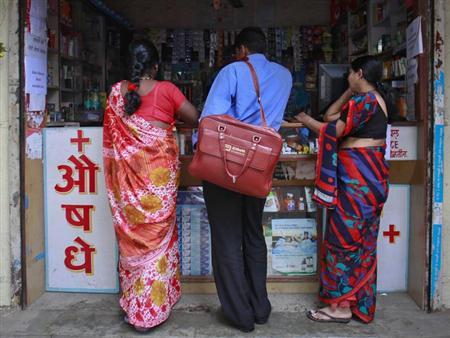LONDON/MUMBAI: Stung by a landmark patent defeat, Western drugmakers will be wary about launching new products in India, but they cannot afford to quit a country tipped to be the world’s eighth largest market for medicines by 2016.
Makers of patented drugs will in future have to get more creative about doing business in India, including striking deals with local firms to sell cheaper versions of their drugs, industry experts believe.
The decision by the Supreme Court on Monday not to allow a patent on Novartis AG’s cancer drug Glivec angered but did not surprise US and European drug companies, given past intellectual property (IP) setbacks.
And it is unlikely to send them rushing for the exit.
“India is too big to ignore,” said Amit Backliwal, who heads South Asian operations for leading healthcare information provider IMS Health.
“Companies will definitely get cautious, and it definitely means a change in their business model, but I don’t think they will pull out.”
On paper, there is huge potential in India’s rapidly growing $13 billion-a-year drugs market, which is driven these days by chronic diseases such as diabetes as well as infections.
[caption id=“attachment_683701” align=“alignleft” width=“450”] On paper, there is huge potential in India’s rapidly growing $13 billion-a-year drugs market, which is driven these days by chronic diseases such as diabetes as well as infections.[/caption]
Impact Shorts
More ShortsSo far, though, it has failed to become a money-spinner for the world’s top pharmaceutical companies, despite a new law in 2005 allowing drug patents for the first time.
Innovative patented drugs make up no more than 5 percent of sales, according to IMS, and they have been under siege after a series of rulings allowing generics firms to over-ride patents for cancer drugs like Bayer’s Nexavar.
New Delhi has pulled no punches in its fight with Big Pharma, both by raising the bar for patents and being ready to issue so-called compulsory licences that open the door for cheap generics when patented drugs are deemed unaffordable.
In the face of such hurdles, some companies are already building new business models.
Roche Holding, for example, plans to offer cut-price versions of two blockbuster cancer drugs Herceptin and MabThera under an alliance with Indian generics firm Emcure Pharmaceuticals.
It is a scheme that Ajay Kumar Sharma, associate director of the pharmaceutical and biotech practice at business consultancy Frost & Sullivan, believes other drugmakers could now emulate.
CALCULATED RISK
India’s stance on IP has long been a thorn in the side of Western business, prompting calls by Pfizer and other US firms last month for more pressure on the country to reform policies that can block US exports.
The argument cuts little ice in India, where officials see differential pricing - steep discounts for less well-off markets - as an obvious option for Western companies.
“It is up to them to decide on India. Don’t forget, India is a large market, a country of 1.2 billion,” said Raghunath Mashelkar, former director general of the Council for Scientific and Industrial Research and an architect of India’s IP policies.
With differential pricing common in industries from autos to mobile phones, he argues pharmaceutical firms must find new ways to make products affordable for lower-income groups.
“Drugmakers will have to work out strategies for the lower sections, to give affordable access to medicines and make money by large volumes and smaller margins,” he told Reuters. “And then they will look at the middle and the upper sections and make money through smaller volumes but higher margins.”
It is a calculated risk, yet a number of drugmakers are already coming around to the view that trading volume for price is the way forward.
One of those is GlaxoSmithKline, which has a large footprint in India and has just invested $900 million to raise its stake in its consumer healthcare subsidiary.
GSK’s diversified approach to healthcare is shared by a number of rivals, including Novartis, that also have big interests in over-the-counter (OTC) remedies and branded generics, in addition to innovative medicines.
It is this non-prescription sector that is set to dominate in India, driving double-digit percentage growth in a market that IMS has forecast will reach $24-34 billion by 2016, vaulting the country to eighth from 14th in the global league table.
PricewaterhouseCoopers puts sales by 2020 at $49 billion.
Much of the new business will still come from cheap generics made by local companies, but Western firms are also seeking to put their brands on unpatented medicines, prompting the likes of Abbott Laboratories and Daiichi Sankyo to buy up Indian companies.
BETTER BETS ELSEWHERE
With sales of patented drugs in Western countries slowing, emerging markets are a vital growth driver for drugmakers. India cannot be ignored, but there are clearly better bets elsewhere.
“Emerging markets are growing at two to three times the rate of Western markets, but you’ve got to be in the right markets - you want to be in China and in Brazil,” said Tim Race at Deutsche Bank.
“India could be a really exciting market, given its increasing middle class, but the home-grown generics industry is extremely strong, and the patent situation is very difficult.”
India’s patent stance also reverberates beyond its shores, since the country’s generics firms export their cheap medicines across the developing world.
So far, no other country has followed India with similar laws preventing the kind of secondary patent that stymied Glivec, though Michelle Childs, head of drug access policy at Medecins Sans Frontieres, said others were raising the patent bar in more subtle ways.
Argentina, for example, recently issued guidelines to patent examiners urging stricter rules for granting new patents, and other countries have used compulsory licences, she noted.
“It’s putting pressure on pharmaceutical companies to realise they can’t continue to charge prices which are unaffordable to the majority of people,” Childs said.
Reuters


)

)
)
)
)
)
)
)
)



